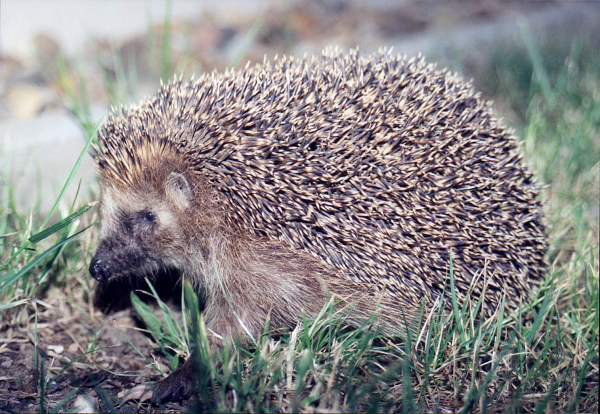|
| Query: carabus | Result: 157th of 157 | |
West European Hedgehog (Erinaceus europaeus) - Wiki
| Subject: | West European Hedgehog (Erinaceus europaeus) - Wiki
| |

| Resolution: 600x414
File Size: 134518 Bytes
Upload Date: 2007:10:29 10:40:13
|
West European Hedgehog
From Wikipedia, the free encyclopedia
[Photo] West European Hedgehog (Erinaceus europaeus). Author: http://de.wikipedia.org/wiki/Benutzer:Olaf1541 | Permission is granted to copy, distribute and/or modify this document under the terms of the GNU Free Documentation License, Version 1.2 or any later version published by the Free Software Foundation; with no Invariant Sections, no Front-Cover Texts, and no Back-Cover Texts. A copy of the license is included in the section entitled "GNU Free Documentation License". |
The West European Hedgehog (Erinaceus europaeus), or simply the European hedgehog, is a hedgehog species found throughout the Palaearctic region, except in the Himalayas and North Africa. It is not commonly found above 60°N in latitude, except for Finland, Sweden and the Northwestern-most parts of Russia.
This hedgehog is about 20 cm in length, and lives in woodland, farmland, and suburban areas. It is nocturnal, and if alarmed will roll itself into a ball, protecting itself against potential predators with its spines.
Unlike the smaller, warmer climate species, the West European Hedgehog may hibernate in the winter. It is omnivorous, feeding on a wide range of invertebrates, but preferring slugs, earthworms, beetles and other insects. The preferred arthropods are the millipedes Glomeris marginata and Tachypodoiulus niger as well as the ground beetle Carabus nemoralis. It is also known to eat frogs, small rodents, young birds and birds' eggs.
This species has become a serious pest in the Western Isles of Scotland, where introduced hedgehogs eat the eggs of ground-nesting waders such as Snipe, Dunlin, Redshank and Lapwing. It is also considered a pest in New Zealand where it preys upon the native giant snails (Powelliphanta), weta, and various other native invertebrates
Blonde hedgehogs have a rare recessive gene giving rise to beady, button-black eyes and attractive creamy-coloured spines; they are not strictly speaking albino. They are extremely rare except on the Channel Island of Alderney and are nicknamed "Alderney Spike Girls". A population of around a thousand is believed to exist. They allegedly carry no fleas, and are a localised island variant of Erinaceus europaeus.
A low coverage assembly of the genome of Erinaceus europaeus was released by the Broad Institute in June 2006 as part of the Mammalian Genome Project.
Protection list
On august 28, 2007, the new Biodiversity Action Plan (BAP) [launched in 1997] included the West European Hedgehog on the list of species and habitats in the UK that need conservation and greater protection.
http://en.wikipedia.org/wiki/West_European_Hedgehog
| The text in this page is based on the copyrighted Wikipedia article shown in above URL. It is used under the GNU Free Documentation License. You may redistribute it, verbatim or modified, providing that you comply with the terms of the GFDL. |
|
^o^
Animal Pictures Archive for smart phones
^o^
|
|